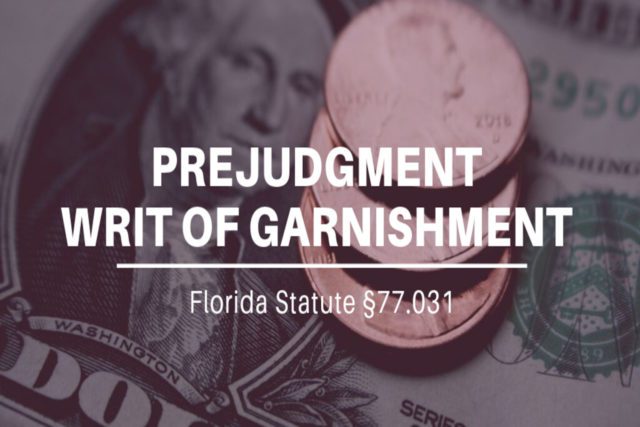Bank and Wage Garnishments
What are bank and wage garnishments?
Under Florida law, post-judgment bank and wage garnishments are legal procedures that allow a creditor to collect on a debt after obtaining a court judgment. A bank garnishment enables the creditor to seize funds from the debtor’s bank account. In contrast, a wage garnishment allows the creditor to receive a portion of the debtor’s income directly from their employer.
A judgment creditor may decide to pursue bank and wage garnishments against a judgment debtor when other collection methods have failed to satisfy the debt. Judgment creditors seek garnishment most often when at least one of the following circumstances applies:
- Uncooperative debtor: If the judgment debtor is uncooperative and refuses to make payment arrangements, a creditor may choose to garnish their wages or seize funds from their bank account.
- Insufficient assets: If the judgment debtor has none-to-few assets, a creditor may choose to garnish their wages to collect on the debt.
- Inability to locate assets: If the creditor cannot identify the assets of the judgment debtor, they may choose to garnish their wages to collect on the debt.
- Defaulted on a payment plan: If the judgment debtor has defaulted on a payment plan agreed upon with the creditor, the creditor may choose to garnish their wages or seize funds from their bank account to collect on the debt.
- High debt amount: If the debt owed by the judgment debtor is high, a creditor may choose to garnish their wages or seize funds from their bank account to collect a significant portion of the debt.
Need help with bank and wage garnishments? Schedule your consultation today with a top accounts receivable and judgment collections attorney.
What legal issues and associated defenses typically arise regarding bank and wage garnishments?
The following issues are among the most commonly litigated in Florida:
- Exempt assets: The judgment debtor may contend that the funds in their bank account or the garnishable wages are exempt from garnishment under state or federal law. For example, some funds in a bank account may be exempt if designated for specific purposes, such as child support or Social Security benefits.
- Calculation of disposable income: The debtor could alternatively challenge the calculation of their disposable income, which determines the amount of garnishable wages.
- Multiple garnishments: If numerous creditors pursue garnishment, the debtor will likely assert that the combined amount taken from their wages exceeds the legal limit.
- Statute of limitations: If the statute of limitations has expired on the debt, the creditor can no longer pursue garnishment.
- Improper procedures: If the creditor fails to follow proper procedures, such as failing to serve notice of the garnishment or failing to calculate the amount correctly, the debtor will assert this as an affirmative defense.
Please note these are just some common issues regarding bank and wage garnishments in Florida. Every case is different and will depend on particular facts and circumstances. To see what issues and defenses may apply to your unique situation, please contact our office to set up your initial consultation.
What are relevant laws related to bank and wage garnishments in Florida?
- In Florida, state and federal law govern post-judgment bank and wage garnishments. Some of the relevant Florida and federal laws and regulations related to post-judgment bank and wage garnishments against a judgment debtor include:
- Florida Statutes, Chapter 77: This chapter governs garnishments and executions in Florida, including the procedures for obtaining and enforcing a judgment, the exemptions available to judgment debtors, and the limits for garnishment of judgment debtor’s wages or bank account.
- Florida Constitution, Article X, Section 4: This section of the Florida Constitution provides that homestead property is exempt from forced sale and protects the exemptions in perpetuity. This provision may limit the ability of a judgment creditor to seize a judgment debtor’s bank account or wages if the funds are necessary to maintain the debtor’s homestead property.
- Fair Labor Standards Act (FLSA): The FLSA is a federal law that sets standards for minimum wage, overtime pay, and child labor. The FLSA also limits the garnishable amount of a judgment debtor’s disposable income from their paychecks and requires that employers provide notice to the judgment debtor of the wage garnishment.
- Consumer Credit Protection Act (CCPA): The CCPA is a federal law that limits the garnishable amount of a judgment debtor’s disposable income for consumer debts, such as credit card debt, medical bills, and personal loans.
- Bankruptcy Code: The Bankruptcy Code is a federal law that provides for the protection of debtors facing collection efforts, including wage and bank garnishments, through the automatic stay provisions of the Code. If a judgment debtor files for bankruptcy, the court may stay wage and bank garnishments while the bankruptcy case is pending.
What is required to pursue bank and wage garnishment actions in Florida?
In Florida, a judgment creditor must follow specific procedures to pursue bank and wage garnishments against a judgment debtor. The following steps are generally required:
- Obtain a judgment: The judgment creditor must first obtain a decision in their favor from a court of competent jurisdiction. The judgment should specify the amount owed by the judgment debtor, as well as the creditor’s right to pursue collection efforts, including wage and bank garnishments;
- Serve a Writ of Garnishment: After obtaining a judgment, the judgment creditor must serve a Writ of Garnishment on the judgment debtor’s employer and bank. The Writ of Garnishment is a court order that requires the employer or bank to withhold a portion of the judgment debtor’s wages or funds in their bank account and pay the same to the judgment creditor;
- Provide notice to the judgment debtor: The judgment creditor must provide notice to the judgment debtor of the wage or bank garnishment. This notice should include information about the withhold-able amount, the rights of the judgment debtor, and any exemptions that may be available to the judgment debtor under state or federal law;
- Comply with exemptions: Before withholding wages or funds from a judgment debtor’s bank account, the employer or bank must determine whether the judgment debtor is entitled to any exemptions under state or federal law; and
- Provide a hearing: The judgment debtor may request a hearing to contest the wage or bank garnishment. The hearing allows the judgment debtor to raise objections or defenses to the garnishment, including applicable exemptions.
When a set of facts is appropriate to meet the requirements of judgment collection, there are many paths a claimant may take. We are value-based attorneys at Jimerson Birr, which means we look at each action with our clients from the point of view of costs and benefits while reducing liability. Then, based on our client’s objectives, we chart a path forward to seek appropriate remedies, such as bank and wage garnishments.
To see what actions may be available for your unique situation, please contact our office to set up your initial consultation.
Have more questions about a bank and wage garnishment-related situation?
Crucially, this overview of bank and wage garnishment does not begin to cover all the laws implicated by this issue or the factors that may compel the application of such laws. Every case is unique, and the laws can produce different outcomes depending on the individual circumstances.
Jimerson Birr attorneys guide our clients to help make informed decisions while ensuring their rights are respected and protected. Our lawyers are highly trained and experienced in the nuances of the law, so they can accurately interpret statutes and case law and holistically prepare individuals or companies for their legal endeavors. Through this intense personal investment and advocacy, our lawyers will help resolve the issue’s complicated legal problems efficiently and effectively.
Having a Jimerson Birr attorney on your side means securing a team of seasoned, multi-dimensional, cross-functional legal professionals. Whether it is a transaction, an operational issue, a regulatory challenge, or a contested legal predicament that may require court intervention, we remain a tireless advocate every step of the way. Being a value-added law firm means putting the client at the forefront of everything we do. We use our experience to help our clients navigate even the most complex problems and come out the other side triumphant.
If you want to understand your case, the merits of your claim or defense, potential monetary awards, or the amount of exposure you face, you should speak with a qualified Jimerson Birr lawyer. Our experienced team of attorneys is here to help. Call Jimerson Birr at (904) 389-0050 or use the contact form to set up a consultation.

We live by our 7 Superior Service Commitments
- Conferring Client-Defined Value
- Efficient and Cost-Effective
- Accessibility
- Delivering an Experience While Delivering Results
- Meaningful and Enduring Partnership
- Exceptional Communication Based Upon Listening
- Accountability to Goals











